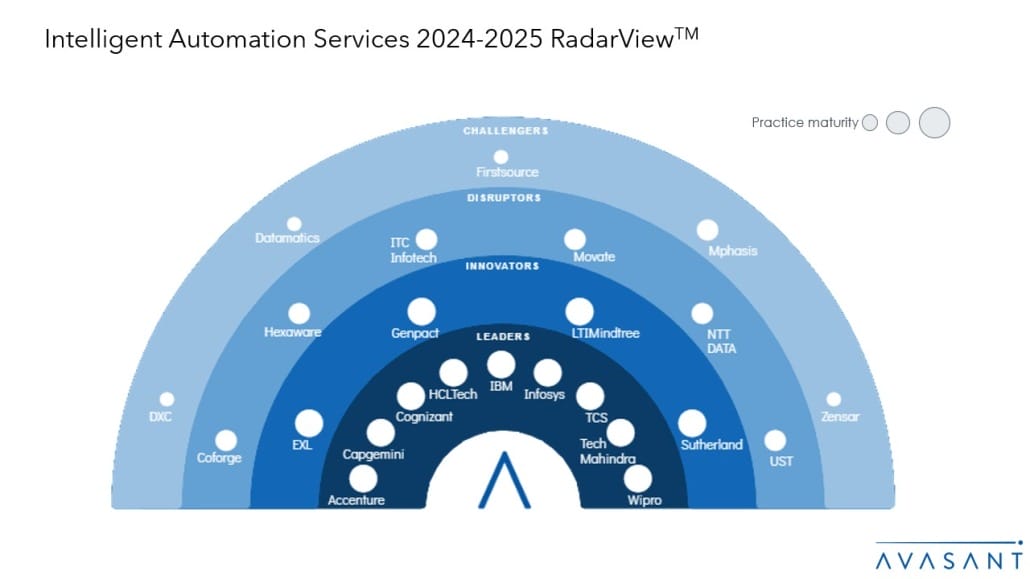Advancements in AI and generative AI (Gen AI) technologies such as synchronous AI agents, copilots, and autonomous visual reasoning tools, like Anthropic’s computer use, are revolutionizing the automation landscape. Enterprises are increasingly focusing on automating complex use cases that traditionally required intensive human intervention, including customer experience management, sales lead qualification, and real-time decision-making tasks. This shift has prompted organizations to elevate their investments in automation, prioritizing the development of truly touchless workflows capable of handling intricate processes. By leveraging these advanced AI capabilities, enterprises can achieve seamless integration, scalability, and higher operational efficiency.
Both demand-side and supply-side trends are covered in Avasant’s Intelligent Automation Services 2024–2025 Market Insights™ and Intelligent Automation Services 2024–2025 RadarView™, respectively. These reports present a comprehensive study of intelligent automation service providers and closely examine the market leaders, innovators, disruptors, and challengers.
Avasant evaluated 34 service providers across three dimensions: practice maturity, partner ecosystem, and investments and innovation. Of the 34 providers, we recognized 24 that brought the most value to the market during the past 12 months.
The report recognizes service providers in four categories:
-
- Leaders: Accenture, Capgemini, Cognizant, HCLTech, IBM, Infosys, TCS, Tech Mahindra, and Wipro
- Innovators: EXL, Genpact, LTIMindtree, and Sutherland
- Disruptors: Coforge, Hexaware, ITC Infotech, Movate, NTT DATA, and UST
- Challengers: DXC, Datamatics, Firstsource, Mphasis, and Zensar
Figure 1 below from the full report illustrates these categories.

“The recent emergence of synchronous AI agents is a game-changer, empowering enterprises to automate highly complex processes,” said Anupam Govil, Managing Partner at Avasant. “This marks the dawn of an era where businesses will prioritize creating truly touchless automation workflows enabling the long-aspired dream of straight-through processing.”
The reports provide several findings, including the following:
-
- In the next 12 months, about 88% of enterprises plan to increase their investments in intelligent automation by at least 25%, primarily focusing on achieving truly touchless automation for complex use cases such as order return processing, software development, and customer segmentation.
- The manufacturing, retail and CPG, and healthcare and life sciences sectors are leading the adoption of intelligent automation services driven by growing customer demand for hyperpersonalization, strict regulatory compliance requirements, and a strong focus on cost optimization.
- Gen AI is expediting the implementation of intelligent automation by streamlining various aspects of the IA development life cycle, such as identifying workflow bottlenecks, monitoring bots, and tracking KPIs.
“The integration of Gen AI is driving down automation project costs through advanced workflow optimization,” said Chandrika Dutt, associate research director at Avasant. “The next phase of automation will transcend efficiency, empowering systems to be adaptive, predictive, and self-optimizing, unlocking transformative potential for enterprises.”
The Intelligent Automation Services 2024–2025 RadarView™ also features detailed profiles of 24 service providers, along with their solutions, offerings, and experience in assisting enterprises in their intelligent automation journeys.
This Research Byte is a brief overview of Avasant’s Intelligent Automation Services 2024–2025 Market Insights™ and Intelligent Automation Services 2024–2025 RadarView™ (click for pricing)


